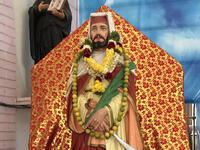
Please join us for a lunchtime talk with Institute of Sacred Music fellow, Dr. Davesh Soneji. Since lunch is included, RSVP to raymond.vogel@yale.edu by Monday, November 13, 2023.
Note: Seating capacity is limited and will be given on a first-come, first-served basis.
Since at least the eighteenth century, Tamil Christians have deployed raga-based music and South Indian musical genres to address not only theological and soteriological concerns, but also themes related to caste, community, and social life. This presentation, part of a larger book project entitled Unbounded Tunes: Genealogies of Musical Pluralism in Modern South India, examines Tamil Catholic forms of popular, paraliturgical music produced between 1880 and 1930. These musical works are markedly not meant to be used in public forms of liturgy, nor are they sanctioned or endorsed by the elite institutional authorities of the church. Tamil print archives preserve a vast amount of such music, including pilgrimage songs, songs for feasts and holidays, processional songs meant to be sung during Catholic chariot festivals (ter urcavam), and songs that are simply personal devotions, especially those addressed to the Virgin and localized saints. These types of popular songs, produced across a range of South Indian musical genres, ragas, and tunes (mettu), are artefacts of highly localized forms of Tamil Catholic devotion and cannot be severed from their subregional origins and points of reference.
In this presentation, Dr. Davesh Soneji focuses on two case studies to illustrate the ways in which musical composition and performance are sites for both staging and contesting conversations around caste and power in southern Tamil Nadu. The first is a set of musical compositions in the kirttanai genre dedicated to the shrine of Nossa Senhora das Neves (Panimaya Mata) in the town of Thoothukudi produced from the late nineteenth century to articulate a distinctly new caste identity for the former oppressed-caste Paravar (now “Bharatar”) community of pearl-divers and fishers. Their musical organization (cankita capai) was formed at a time when their caste status and the authority of their “caste headman” (jati-talaivar) were in question by both the colonial state and Catholic religious authorities. The second is a musical drama tradition centered around the figure of the Portuguese martyr-saint João de Brito (1647-1693) in the town of Oriyur, where the saint’s martyrdom is taken up by two oppositional caste-groups, the former oppressed-caste Panaiyeri Nadars and the dominant-caste Tevar Maravars. On the one hand, in these examples, songs of benediction, praise, miraculous power and “the good death” (nalla maranam) or martyrdom, move ubiquitously and continually through the Tamil Catholic musical landscape for very different ends. On the other hand, both examples also illustrate how vernacular Catholicism in this region deployed caste-based performance practices to assert identities and perform varieties of Catholic devotional experience. This paper maps how popular raga-based music must therefore be seen as an integral part of the non-sacramental religious needs of Tamil Catholics at the turn of the century that included a range of popular devotional idioms from healing rituals, penance, and sacrifice to the production of socio-sonic piety.
Davesh Soneji is Associate Professor of South Asia Studies at the University of Pennsylvania. He holds a Ph.D. in Religious Studies from McGill University, and is author of the award-winning book Unfinished Gestures: Devadasis, Memory, and Modernity in South India. His new work on Tamil music is forthcoming in a monograph titled Unbounded Tunes: Genealogies of Musical Pluralism in Modern South India. He is also currently editing a volume of essays entitled Caste, Community, and the Performing Arts of Modern South India that highlights new work by a group of emerging scholars, and with Anna Morcom, is co-editor of the forthcoming Routledge Handbook of Indian Music. He is presently a Senior Research Scholar at Yale’s Institute of Sacred Music.